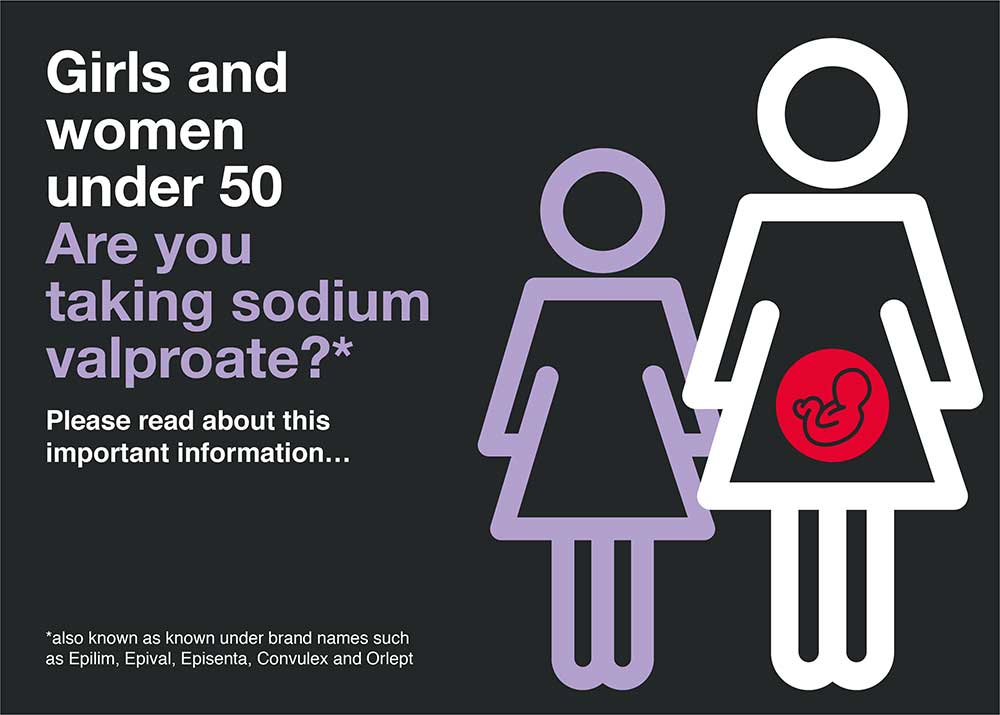Women still not aware of epilepsy medicine risk in pregnancy
Almost 1 in 5 (18%) women currently taking the epilepsy medication sodium valproate do not know it can harm the development and physical health of their unborn child should they become pregnant.
More than a quarter (28%) of women taking the epilepsy drug have not been given information about risks for their unborn child.
More than two thirds (68%) of women taking the epilepsy drug have not received specially produced valproate materials released in February 2016.
Charities call on government to make annual reviews mandatory for women taking the drug

Almost 1 in 5 (18%) women currently taking the epilepsy medication sodium valproate do not know it can potentially harm the development and physical health of their unborn child should they become pregnant. This was the worrying statistic revealed in a new survey carried out by the UK's three leading epilepsy charities.
More than 2,000 women with epilepsy took part in the survey, conducted by Epilepsy Society, Epilepsy Action and Young Epilepsy. The survey revealed that just over a quarter (28%) of women who responded, and are currently taking sodium valproate, had not been given information about risks for children exposed to the drug during pregnancy.
It is estimated that around 10% of babies born to women who take sodium valproate during pregnancy are born with physical disabilities. Up to 40% are at risk of developmental issues that can lead to learning difficulties.
Toolkit to raise awareness of valproate risks
These results are in spite of efforts by the Medicines and Healthcare products Regulatory Agency (MHRA) to raise awareness of the issue among healthcare professionals and women with epilepsy. In February 2016, the MHRA released a valproate toolkit to help healthcare professionals talk to women with epilepsy about the risks during pregnancy. The toolkit includes a credit card-sized patient card to be issued by pharmacists, booklets for healthcare professionals and women taking sodium valproate, and a checklist of important discussion points.
However, 18 months later, the survey shows that more than two thirds (68%) of respondents currently taking sodium valproate have still not received any of the toolkit materials.
Michelle's story

Twenty-four hours after having her first baby at 16, Michelle Hackett started having multiple seizures and was prescribed sodium valproate. Less than a year later, her second baby was born with six toes on each of his feet, an underlying jaw and, when his teeth came through, eight of them were black and rotten.
Michelle says: “'I had a scan and the hospital told me that because I was on Epilim (sodium valproate), I would have to get rid of the baby. They said it could be born with cerebral palsy. I refused. I asked why I hadn't been told about the dangers around Epilim but they said because I was young, they didn't think I would get pregnant again.
“I was very relieved Stephen didn't have cerebral palsy. I really feel he was one of the lucky ones but as a baby and toddler he had to have a lot of operations to correct his problems. “I feel absolutely furious that I wasn't told about the side effects of Epilim. When I hear about mums with Epilim and what they go through it is heart-breaking. It is terrible to be given a drug for a severe illness and not be told about the side effects.
Michelle is now taking a different epilepsy medication and a year ago gave birth to a healthy baby girl, Thea.
Call on government to act
Epilepsy Society, Epilepsy Action and Young Epilepsy are now calling on the government to ensure that repeat prescriptions for sodium valproate for women and girls of childbearing age are not routinely renewed for more than 12 months without a face-to-face consultation with a doctor or nurse. This consultation must include personal and tailored information about the risks around sodium valproate during pregnancy. Information should also be provided in written format.
This will help to ensure that women and girls with epilepsy who are prescribed sodium valproate are fully informed about the risks to their unborn baby should they continue to take the drug while pregnant.
Epilepsy Society's Clare Pelham says
Clare Pelham, chief executive at Epilepsy Society said: "This is a very simple and straightforward ask of the government. No additional funding is required for the NHS. All we are asking is that doctors and nurses have a yearly conversation with women and girls who are taking sodium valproate, to make absolutely certain they are aware of the risks associated with the drug during pregnancy.
"We know that for some women, sodium valproate will be the only drug that controls their seizures and they must carefully weigh the benefits against the risks. But what is unforgiveable is for women not to be informed of those risks. They must be able to make an informed choice about their treatment in conjunction with their doctor.”
Informed choice
Philip Lee, chief executive at Epilepsy Action, said: “It is vital that women with epilepsy get the right information about their care and treatment to ensure a healthy pregnancy and minimise the risks associated with sodium valproate.
“Yet these figures suggest that information is not filtering down to women and that conversations about the potential risks are not always happening. Discussions with a health professional about these risks should be a mandatory part of care for all women with epilepsy so they can make informed choices, ideally before they conceive.”
Sodium valproate awareness survey
It's not too late to take part in our sodium valproate awareness survey. Open to all girls and women under the age of 50, even if you are not taking sodium valproate.
